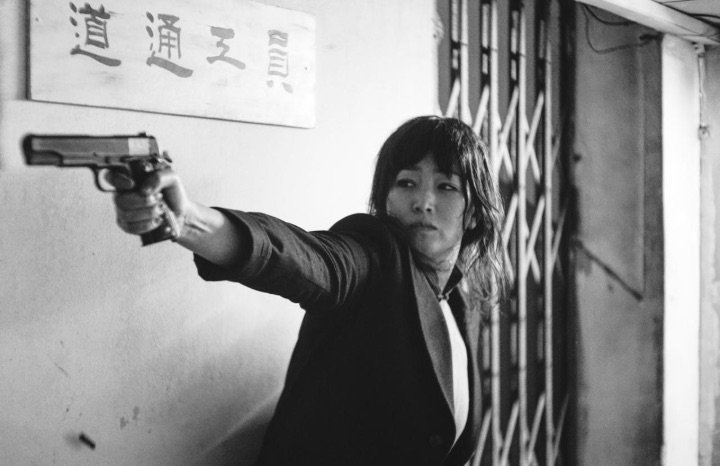Gong Li’s yarn of empowered female espionage in war-torn Shanghai aimed big at the Chinese box office, but confuses complexity for entertainment
After the cancellation of its planned high-profile premiere due to vague “internal production problems” in 2019, Saturday Fiction (《兰心大剧院》), a black-and-white thriller, finally hit Chinese big screens on October 15.
Director Lou Ye oversees a star-studded cast, including internationally-renowned actress Gong Li, Japanese actors Joe Odagiri and Ayumu Nakajima, French veteran actor Pascal Greggory (icon of French cinema for more than five decades and three-time César nominee) and Game of Thrones star Tom Wlaschiha. It now sees itself—finally—debuting in China in the recently concluded 11th Beijing International Film Festival.
Saturday Fiction promised so much: An espionage story with romance, action, and betrayal thrown in, all the ingredients to keep audiences entertained and the box office stuffed full. However, the plot and visuals are regrettably undermined by Lou’s pursuit of provocative aesthetics, making it hard for the film to pull at the heartstrings of Chinese audiences.
Adapted from the novels Death in Shanghai by British Chinese writer Hong Ying in 2009 and Shanghai by Japanese author Yokomitsu Riichi, the film revolves around actress Jean Yu (Gong), returning to Shanghai to star in the play "Saturday Fiction" directed by and co-staring her old flame Tan Na (Mark Chao) in 1941 when the foreign concessions of the city have been reduced to an “isolated island” by the Japanese invasion. Various parties are inexplicably keeping close track of her movements, including the obsequious manager (Wlaschiha) of her French Concession hotel tapping her phone. Speculation abounds in Shanghai society about Jean’s ulterior motive for returning to the city, ranging from rekindling her love with Tan to rescuing her ex-husband (Zhang Songwen) who is being held in a Japanese prison.
As the movie unfolds, Jean’s real identity is unveiled as a spy for the Allied Powers, but in the process reveals this is but one part of a more complex whole. She takes orders from her French foster father Frederic Hubert (Greggory), himself a spy. But after Jean wrests intelligence about Japanese plans to attack Hawaii out of the official Mr. Furuya (Joe Odagiri), by virtue of her uncanny resemblance to his dead wife, she doesn’t give her foster father the true information. This allows the attack on Pearl Harbor to go as planned, altering the course of history with the United States entering World War II.
The film reflects a more commercial turn in Lou’s filmmaking oeuvre. The 1965-born director from Shanghai, known for dark documentary-like films full of sex, violence, and death. His works seldom venture into the mainstream and therefore are not hot property in the domestic film market. Nevertheless, previous works like Suzhou River (2000), Purple Butterfly (2004), and Spring Fever (2009) earned him much international prominence.
But despite critical success in Europe—nominated for the Golden Lion Award at the 76th Venice International Film Festival—Lou’s offering has been met with lukewarm audience numbers and mixed reviews. The movie has a respectable (though not outstanding) score of 7.3 out of 10 on China’s most popular film reviewing platform, Douban. Figures from Maoyan, a leading movie-ticketing platform in China, shows the espionage story had garnered 15 million RMB in the cumulative box office, with the total number of moviegoers less than 500,000 in its first three days, much lower than expected.
Perhaps this is because Saturday Fiction was released exactly one week after the National Day holiday, with would-be cinema-goers already returned to work. Meanwhile, it is not easy for Saturday Fiction to survive stern competition from patriotic blockbusters The Battle At Lake Changjin and My Country, My Parents, which have been dominating the holiday chart with a whopping 5 billion RMB and 1 billion RMB in box office revenue, respectively.
Lou follows the play-within-a-play narrative style of the original novels, where sometimes the audience will find themselves immersed in the film’s plot, and sometimes in the plot of the play-within-a-film. Indeed, the movie begins in a rehearsal, with Jean playing a strike leader of the patriotic May 30th Movement of 1925 (五卅运动) against the Japanese and the Beiyang government, alongside Tan as the male lead. In an interview with CINECINA film festival in 2020, Lou clarified this is actually a hint to the audience from the beginning that space and time are confused in the film. He openly expressed his love for the idea of shuttling back and forth between fact and fiction, theater and reality, claiming this allows the film to examine the destinies of different people during this age of turbulence.
By adopting handheld cameras, shaking slightly as the action plays out, Lou injects this turbulence into each shot. He creates a world in which crisis may break out at any time. It is perfect for the tense gun-toting finale, which feels so immersive that the theater audience might think they have to dodge some bullets themselves.
Such innovations fit the arthouse bill. “Lou is so talented! Black-and-white [filmmaking] is way better than color. The 1941 Shanghai shot in black-and-white fits well with the story’s background, making the film feel more real and artsy. I like the texture of the footage,” moviegoer Wu Jingfan told TWOC outside a Beijing cinema after a screening.
Chinese film elites will be as pleased as their Western counterparts. In a paper published on Chinese academic journal Movie Review, Professor Zhang Yan of Beijing Normal University, and Ran Yuguo, a postgraduate student, wrote “What sets Saturday Fiction apart from traditional spy movies is its portrayal of female characters…the focus on female emotion, psychology, and growth means the film is far more than an espionage adventure.”
The subplot between Jean and Bai Mei (Huang Xiangli), a Kuomintang spy tasked with finding out Jean’s hidden motive, does indeed make the film special. Bai initially tries to win Jean’s trust as a fan of her work, but Jean sees through her from the start. They began a relationship of mutual exploitation, which later evolves into a relationship of mutual support when they find their shared passions for acting and their similarly lonely childhoods as orphans.
The women have no choice in their assigned identities in this age of conservative gender norms, but that doesn’t mean they won’t rebel and pursue what they really desire. Bai refuses to betray Jean and aspires for an acting career, while Jean desires to end the war, going against both her role and her foster father in her decision to withhold information. Their courage to rebel originates from their powerful, mutually supportive relationship.
However, not everyone sings praises for Lou’s film. Actually, audience’s reactions are polarized. “I feel dizzy and lightheaded due to the shaky camera. I seldom got a clear moment to watch the performance of the actors and to contemplate their faces, especially the face of my goddess Gong Li,” Wang Qi, a student in Tianjing, tells TWOC.
Lou’s bold aesthetic choices make for difficult viewing. Many scenes are set in heavy rain and gloomy streets to convey a dismal mood. They are further blurred by Lou’s black-and-white palette, and end up being unrecognizable for audiences already fairly disorientated by Lou’s unsteady hand-held cameras.
Critics also took aim at the shallow characterization and weak plot. “This seemingly mysterious and complex female character is not fully supported by clear details in the film, and the portrayal of male characters with whom she has a relationship are also limited, leaving audiences confused about the plot. The result is that even though a great deal of attention is devoted to the heroine, it is still difficult to get inside the character's heart,” movie critic Da Zi wrote in her review for news app Litchi News.
Plot holes abound. For example, why is Jean’s ex-husband being held by the Japanese, and why is her plan to rescue him riddled with so many flaws? Without these explanations, Jean’s ex-husband only seems to be there to propel the plot along. Jean’s relationship with her lover Tan is similarly absent of backstory.
Weak storytelling and a poor viewing experience might limit Saturday Fiction’s potential to make it big commercially. But its female perspective of war and its focus on female choices in their identity can help win over some viewers and critics.













